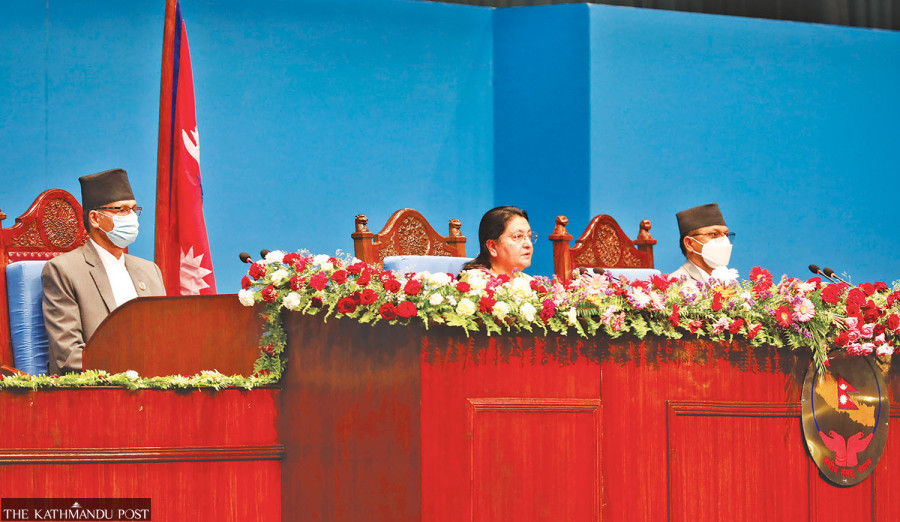Editorial
Promises galore
People have become used to taking these hollow statements with a pinch of salt.
Presenting the government’s policies for the fiscal year 2022-23 at a joint session of both Houses of Parliament on Tuesday, President Bidya Devi Bhandari conveyed an optimistic message amid the trials and tribulations Nepal is currently undergoing. Government policies are always full of optimism and well-intended programmes designed to uplift the downtrodden and take the nation towards economic progress and prosperity. But the sweeping statements made in Parliament have failed to make any credible impact on people’s lives. Sadly, the Nepali people have become used to taking these hollow statements with a pinch of salt as the tall promises often remain just that.
The country's depleting foreign exchange reserves has been a constant rhetoric over the past few months. But the politicians, unmindful of the world around them, have been busy in their petty political squabbles and paid little heed to the rumblings within the country and beyond. With the prolonged impact of the pandemic now beginning to bite into the reserves, the government suddenly finds itself between the devil and the deep blue sea. For far too long, Nepal has relied wholly on imports, even products that it has the means to produce. Due to these faulty policies, internal markets were wrecked over time only to enrich a handful of retailers along the way.
According to the Department of Customs, as of the first 10 months of the current fiscal year, Nepal’s import bill has risen to Rs1,604.65 billion. A staggering figure by any stretch of the imagination which has precipitated a slew of measures by the government to curb imports, but all seems a bit too little too late. It is almost certain that the government would have continued its previous policy of uncontrolled imports had it not been for the current crisis. But the government’s policies read out by the president on Tuesday to boost domestic production and consumption and promote exports should have been a priority before any of the explosive crises that may befall us.
As Nepal seeks to boost production, the world is undergoing a fertiliser shortage that will gravely impact food production worldwide. We are already beginning to see countries securing their food supplies. India recently has taken steps to restrict the export of wheat and sugar, citing reasons to tame burgeoning inflation. Still, such measures will undoubtedly affect supplies in Nepal, adding to the existing inflationary pressure on food prices. The ongoing war between Russia and Ukraine couldn’t have come at a worse time for the world when it has been trying to orchestrate a strategy to manage the disruption in the supply chain.
The policies laid before us will work wonders if only the government sets its heart and mind to implement them. In times of crisis, countries worldwide will meticulously look to secure themselves and pay no heed to the concerns of others. Thus, it would be in our interest to achieve some self-sufficiency level, primarily in food production and the energy sector. Promoting the use of electricity, for instance, would provide some level of cushioning effect from the constantly fluctuating price of fossil fuels. It has been said that from crisis comes opportunity, and possibly it is time for Nepali policymakers to turn this moment of crisis into one full of prospects.




 10.12°C Kathmandu
10.12°C Kathmandu













